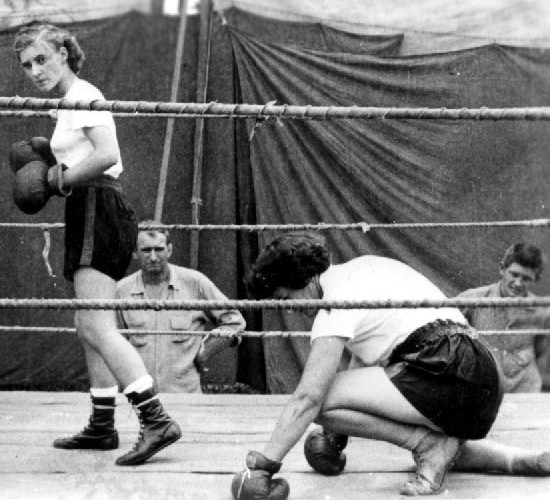By Joseph Clifford in the Cutman Newsletter, vol.1, edition 6: Read the full Cutman Newsletter 6th Edition We really must look at the very essence of women’s boxing to get a connection with women and their role in combat sports today. Furthermore, women have always had two battles to fight, the one in the ring and the one outside of the ring with their peers to get some well-earned respect and acknowledgement. What follows is a brief history. As early as 1720, females fought in England under prize fighting rules which was later banned in Great Britain in 1880 as the new Queensbury rules were implemented in 1865. In the US in 1867 women first officially boxed in New York Hills Theatre, Nell Saunders vs Rose Harland, for a silver butter dish. [caption id="attachment_18560" align="alignleft" width="654"] 3) Nells gets the prize dish while Rose lies unconscious[/caption] Believe it or not women fought men and their own sex in bouts. Thirty-seven years later women’s boxing was admitted but not excepted into the Olympics in St. Louis in 1904. Women’s boxing followed a very different route than their male counterparts’, with most women boxers taking part in exhibitions like Battling Barbara Buttrick who hadwho had a fight screened on TV in 1954. The role of female officials in combat sports has reflected the same passion and resilience as that of the women who fought in back rooms and halls, and who loved their sport. In 1975 Eva Shain was the first women to officiate as a judge at a professional boxing match. In that same year Caroline Svendsen was issued the very first professional boxing licence. These women refused to let gender stop them from acting out key roles in their respected sports and sometimes took drastic action to get a fair deal in the sport they loved so much. 1987 saw Marian Trimiar stage a month long hunger strike to protest for better conditions, pay and recognition for female boxers. Marian said,” It’s my heart, it’s my love.. Unless women get more recognition, we will be fighting just as a novelty for the rest of our lives. There will be no future.” In 1988 Sweden was the first country to lift the ban on women’s amateur boxing. So, it’s no wonder to date that Sweden boasts an unprecedented number of amateur and professional boxing contenders and champions, such as Lena Åkesson, Teuta Cuni, Anna Rosalie Eleonora Laurell Nash, Mikaela Laurén, Sofia Olofsson, Åsa Maria Sandell, Klara Svensson, Freda Walburg, Anna Ingman and Helena Falk. AIBA, the International Boxing Association lifted its ban on women’s boxing in 2009, and in 2012 women’s boxing was included in the Olympics for the very first time to see the crowing of the first ever female Olympic champions in amateur boxing, Nicola Adams, [caption id="attachment_18559" align="alignleft" width="390"]
3) Nells gets the prize dish while Rose lies unconscious[/caption] Believe it or not women fought men and their own sex in bouts. Thirty-seven years later women’s boxing was admitted but not excepted into the Olympics in St. Louis in 1904. Women’s boxing followed a very different route than their male counterparts’, with most women boxers taking part in exhibitions like Battling Barbara Buttrick who hadwho had a fight screened on TV in 1954. The role of female officials in combat sports has reflected the same passion and resilience as that of the women who fought in back rooms and halls, and who loved their sport. In 1975 Eva Shain was the first women to officiate as a judge at a professional boxing match. In that same year Caroline Svendsen was issued the very first professional boxing licence. These women refused to let gender stop them from acting out key roles in their respected sports and sometimes took drastic action to get a fair deal in the sport they loved so much. 1987 saw Marian Trimiar stage a month long hunger strike to protest for better conditions, pay and recognition for female boxers. Marian said,” It’s my heart, it’s my love.. Unless women get more recognition, we will be fighting just as a novelty for the rest of our lives. There will be no future.” In 1988 Sweden was the first country to lift the ban on women’s amateur boxing. So, it’s no wonder to date that Sweden boasts an unprecedented number of amateur and professional boxing contenders and champions, such as Lena Åkesson, Teuta Cuni, Anna Rosalie Eleonora Laurell Nash, Mikaela Laurén, Sofia Olofsson, Åsa Maria Sandell, Klara Svensson, Freda Walburg, Anna Ingman and Helena Falk. AIBA, the International Boxing Association lifted its ban on women’s boxing in 2009, and in 2012 women’s boxing was included in the Olympics for the very first time to see the crowing of the first ever female Olympic champions in amateur boxing, Nicola Adams, [caption id="attachment_18559" align="alignleft" width="390"] 1987. Mariam Trimiar (“Lady Tyger”)Katie Taylor and Claressa Sheilds.[/caption] [caption id="attachment_18564" align="alignleft" width="640"]
1987. Mariam Trimiar (“Lady Tyger”)Katie Taylor and Claressa Sheilds.[/caption] [caption id="attachment_18564" align="alignleft" width="640"] Nicola Adams[/caption] The Cutman newsletter is designed as an educational tool for amateur and professional coaches,fighters, promoters and sports combat enthusiasts, or fans of combat sports.Furthermore, the topics covered in the newsletter are relative to combat sports and for amateur and professionals working ring or octagon side whether that is a Cutman,Referee, Judge, or health care practitioner. We hope you enjoy the read.. Read the full Cutman Newsletter 6th Edition ]]>
Nicola Adams[/caption] The Cutman newsletter is designed as an educational tool for amateur and professional coaches,fighters, promoters and sports combat enthusiasts, or fans of combat sports.Furthermore, the topics covered in the newsletter are relative to combat sports and for amateur and professionals working ring or octagon side whether that is a Cutman,Referee, Judge, or health care practitioner. We hope you enjoy the read.. Read the full Cutman Newsletter 6th Edition ]]>

